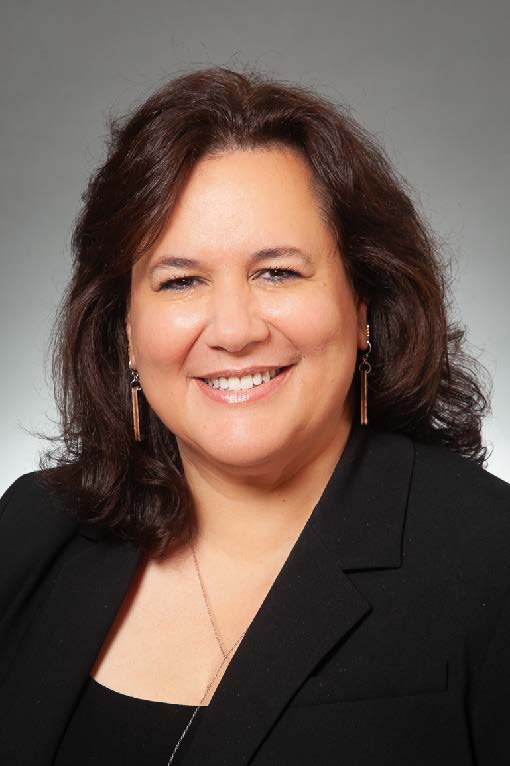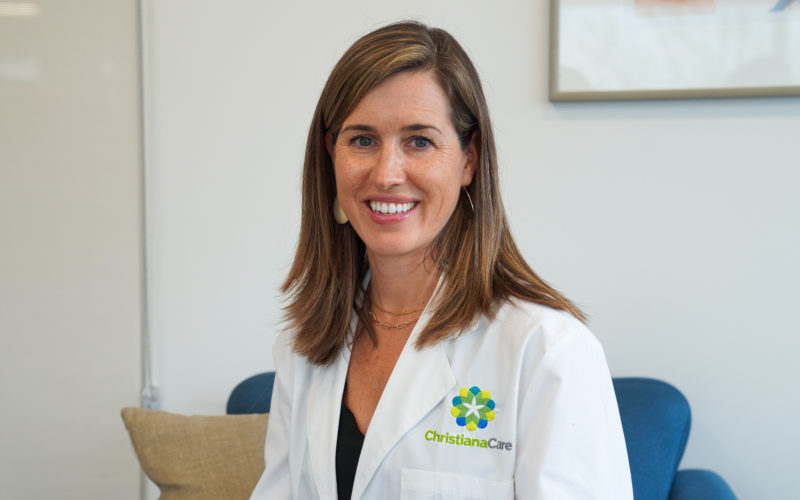Roundtable With State Officials Focuses on Women’s Health

To support the health of women and children in Delaware, ChristianaCare health professionals met with government officials and policymakers on Sept. 29 for a Women’s Health Roundtable.
Women’s health is a focus for Delaware’s General Assembly with two significant bills coming to vote during the 2023-24 legislative session. The bills center on maternal mental health and Medicaid expansion for women’s health services.
While pregnancy outcomes in Delaware are better than in most of the U.S., said Matthew Hoffman, M.D., “there are still some headwinds that face us.” Hoffman is the Marie E. Pinizzotto, M.D., Endowed Chair of Obstetrics and Gynecology at ChristianaCare.
Getting to 40 weeks
In Delaware, one in nine babies was born preterm, according to 2021 data reported in the Journal of the American Medical Association.
The data also showed that approximately 1 in 17 infants in Delaware was born to a woman receiving no prenatal care, accounting for 6% of live births.
Members of the group noted that community members sometimes do not know where to go for help or how to access the services they need at the different stages of their child’s life.
Ongoing government support to connect our neighbors to health resources is essential, Hoffman said.
Community health workers and peer supporters – and the funding to hire and retain them – connect our neighbors to healthy foods through programs like ChristianaCare’s Food Farmacy and educate families about key screenings for a healthy pregnancy such as genetic testing, blood pressure checks and mental health screenings.
To improve outcomes, ChristianaCare has a “care model beyond our walls,” Hoffman said. It is focused on helping pregnancies last the ideal of 40 weeks with regular prenatal care.
Healthy pregnancies mean healthier babies

The path to that goal is based on holistic screenings and support, Hoffman said. ChristianaCare’s “digital bridge” features tools like BabyScripts with healthy pregnancy information and reminders sent right to an expectant parent’s phone and virtual care options to prevent barriers to prenatal appointments.
“If mom is healthy, the baby is much more likely to be healthy,” said David Paul, M.D., chair of Pediatrics.
In 2010, Delaware had the highest rate of unintended pregnancies in the U.S. The rate has decreased by 21% but has stagnated.
Continued government support for contraception is critical to growing this positive trend. Women need increased access to contraception of all types, Hoffman said. “We’ve come very far, but how do we close that last mile?”

Providing the support women and families need means attending to both health disparities and health care disparities, said Jacqueline Ortiz, MPhil, vice president of Health Equity & Cultural Competence at ChristianaCare.
Health disparities are overall differences in higher rates of illness, injury, disability or mortality of one population group compared to another.
Health care disparities are the unexpected differences between groups in health coverage, access to care and quality of care.
“We can’t lose sight of either one,” Ortiz said.
As part of ChristianaCare’s commitment to community health, “we are doubling down to address hypertension, surgical outcomes, breast cancer rates and preeclampsia,” Ortiz said, all of which disproportionately affect different racial, ethnic and socioeconomic groups in disparate ways.
The digital doctor’s office

“We have a poor maternal mortality rate in the U.S. that is tied to race and ethnicity,” said Rose Kakoza, M.D., clinical director of Community Health & Equity for Primary Care and Community Medicine. Black women in Delaware account for 28% of live births and a staggering 78% of pregnancy-related deaths,” she said. “They need access to comprehensive maternal health services.”
To further remove barriers to health care, ChristianaCare’s Center for Virtual Health offers technology and innovative care models, said Sarah Schenck, M.D., FACP, executive director for Virtual Medicine.

“We are collaborating with Women’s and Children’s on virtual care options to remove obstacles like travel and taking time off of work for appointments,” she said.
“We’re not just thinking about the patients in our waiting rooms. We are bringing care to our patients.”
ChristianaCare’s mobile van also brings on-site care and virtual care into Delaware communities. The van is outfitted for primary care and women’s health care.
Supporting women’s and children’s health through legislation

To support the women of Delaware, ChristianaCare health professionals encourage the lawmakers to advocate for the passage of two key bills.
Access to contraception and family planning resources are key to healthy mothers and babies, and so is Delaware House Bill 110, said Sarah Stowens, EdD, manager of State Policy and Advocacy for ChristianaCare. Passage of the bill would guarantee insurance coverage through Medicaid for the termination of pregnancy.
“As you consider the bills before you, we are here to be your experts, your resources,” she said.
Access to mental health services is vital to healthy families, said Malina Spirito, PsyD, director of the Center for Women’s Emotional Wellness at ChristianaCare.
She explained that 25% of women going into a pregnancy have mental health issues, including substance use disorder, and 20% of women develop postpartum depression and anxiety.
“We need to build and sustain our workforce, she said. “Part of that includes supporting our providers’ clinical understanding and comfort in addressing mental health challenges to expand access to maternal and family mental health resources outside of hospitals.”
That’s why it’s important for lawmakers to support Senate Bill 106, Spirito said.
The bill would modernize and expand the concept of maternal mental health in the Delaware Code by replacing the definition of maternal depression with the more encompassing definition of perinatal mood and anxiety disorder.
Updating this code would expand coverage to prenatal, perinatal and postpartum mental health for birthing people and their families.
“We now have more social understanding that mental health issues around pregnancy and childbirth are more than just tissue boxes and tears,” she said.
“They affect the whole family, often very deeply. Support for perinatal mental health challenges improves the long-term health and well-being for the entire family system.”